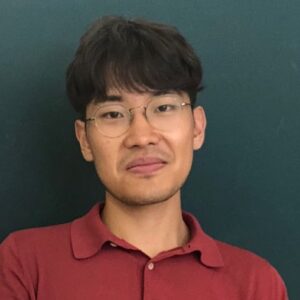Spatial biology is a new frontier that has become accessible through advances in spatial profiling technologies, such as multiplexed in situ imaging spatial proteomics, which can provide single-cell resolution up to 60 markers. In this talk, I will introduce a computational analysis pipeline that performs integrative analysis of spatial proteomics and single-cell RNA sequencing to identify clinically-relevant cellular interactions. The pipeline features (1) CELESTA, an unsupervised machine learning method for cell type identification in multiplexed spatial proteomics data; (2) a geospatial statistical method to identify cell-cell colocalizations; and (3) an integrative coupling of spatial proteomics and single-cell RNA sequencing data that identified cell-cell crosstalk associated with lymph node metastasis in head and neck cancer which we have validated through mouse model studies.
Research link:
https://profiles.stanford.edu/weiruo-zhang
Dr. Zhang is currently a Research Engineer at the Department of Biomedical Data Science and the Center for Cancer Systems Biology, Stanford School of Medicine. Dr. Zhang received her M.S. and Ph.D. in Electrical Engineering, both from Stanford University, with a focus on bioinformatics and developing computational algorithms for metabolomics data analysis. Her current research at Stanford primarily focuses on developing and implementing computational methods to integrate and analyze single-cell and spatial multi-omics data, such as single-cell RNA sequencing, spatial proteomics and spatial transcriptomics. Her research aims to apply quantitative approaches that bridge multi-omics, imaging, machine learning, and artificial intelligence to decipher biology for cancer progression and guide treatment responses.

 Spatial biology is a new frontier that has become accessible through advances in spatial profiling technologies, such as multiplexed in situ imaging spatial proteomics, which can provide single-cell resolution up to 60 markers. In this talk, I will introduce a computational analysis pipeline that performs integrative analysis of spatial proteomics and single-cell RNA sequencing to identify clinically-relevant cellular interactions. The pipeline features (1) CELESTA, an unsupervised machine learning method for cell type identification in multiplexed spatial proteomics data; (2) a geospatial statistical method to identify cell-cell colocalizations; and (3) an integrative coupling of spatial proteomics and single-cell RNA sequencing data that identified cell-cell crosstalk associated with lymph node metastasis in head and neck cancer which we have validated through mouse model studies.
Spatial biology is a new frontier that has become accessible through advances in spatial profiling technologies, such as multiplexed in situ imaging spatial proteomics, which can provide single-cell resolution up to 60 markers. In this talk, I will introduce a computational analysis pipeline that performs integrative analysis of spatial proteomics and single-cell RNA sequencing to identify clinically-relevant cellular interactions. The pipeline features (1) CELESTA, an unsupervised machine learning method for cell type identification in multiplexed spatial proteomics data; (2) a geospatial statistical method to identify cell-cell colocalizations; and (3) an integrative coupling of spatial proteomics and single-cell RNA sequencing data that identified cell-cell crosstalk associated with lymph node metastasis in head and neck cancer which we have validated through mouse model studies. The graph neural network (GNN) and transformer model are two renowned neural network architectures for obtaining contextual embeddings from biomedical data. However, each model has a trade-off in terms of the required dataset for training and representation power of the model. As examples, I will discuss the TEA-graph which employs GNN to define the contextual pathological features related to cancer patients’ survival, and GRIP, which utilizes a combination of GNN and transformer to define the set of immune receptors linked to patients’ survival.
The graph neural network (GNN) and transformer model are two renowned neural network architectures for obtaining contextual embeddings from biomedical data. However, each model has a trade-off in terms of the required dataset for training and representation power of the model. As examples, I will discuss the TEA-graph which employs GNN to define the contextual pathological features related to cancer patients’ survival, and GRIP, which utilizes a combination of GNN and transformer to define the set of immune receptors linked to patients’ survival.